Books
Books
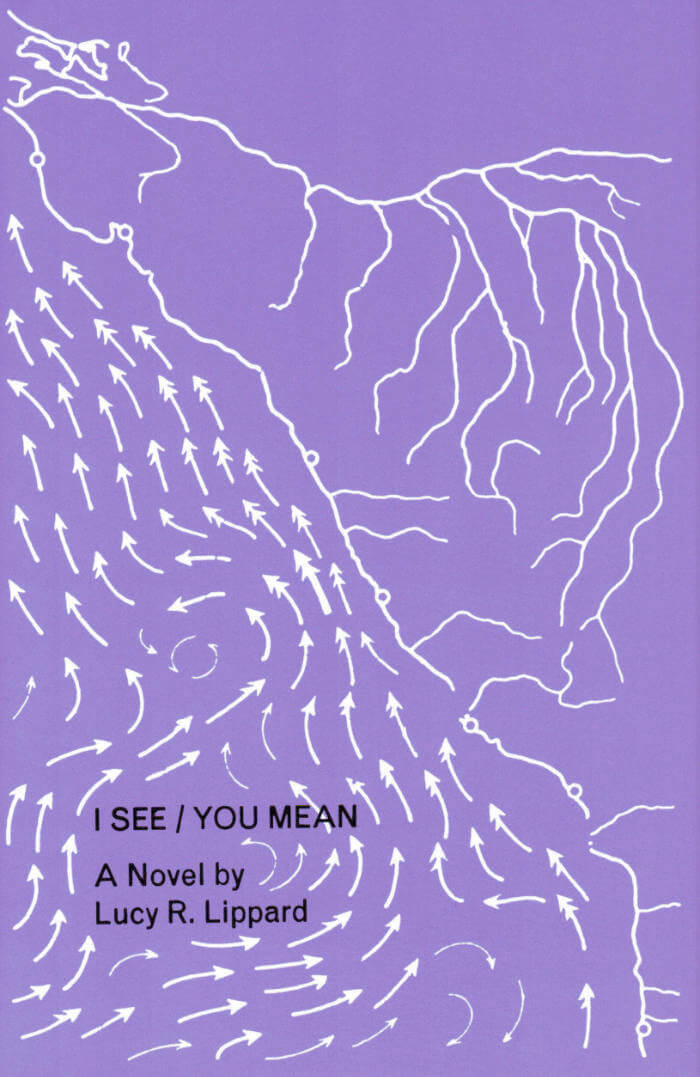
I See / You Mean
I See / You Mean is an experimental novel about mirrors, maps, relationships, the ocean, elusive success, and possible happiness. Through a collage of verbal photographs, overheard dialogue, sexual encounters, found material, and self identification devices (astrology, the I Ching, palmistry, Tarot), it charts from past to future the changing currents between two women and two men: a writer, a model/stockbroker/maybe dictator, a photographer, and an actor. A lot happens between the lines. Art critic Lucy Lippard wrote this novel in 1970 and became a feminist in the process: “I started writing and realized I was ashamed to be a woman. Then I had to find out why. Then I got very angry. The fragmented visual form came out of contemporary art and the conflicting emotions of 1960s political confrontation; they suggested a new way to put things back together—an open-ended, female way that didn’t pretend conclusions.”
Lucy R. Lippard is a writer, activist, and curator. She is the author of twenty-five books on contemporary art and cultural criticism and has curated some fifty exhibitions in the United States, Europe, and Latin America.
Afterword by Susana Torre
Edited by Jeff Khonsary

Neïl Beloufa: People Love War Data & Travels
Myriam Ben Salah, Benjamin Thorel
This is the first monograph on the internationally acclaimed French Algerian artist Neïl Beloufa (born 1985). Love, hatred, war, technology, social unrest, bodies and words in crisis: this is the material of which Beloufa’s work is made. His films, sculptures and multimedia installations audaciously explore how art can address today’s issues, challenging contemporary representations of social relationships, power games, and political and economic structures. An artist favoring collaborations over authorship, and responsive strategies over predetermined intentions, Beloufa has invented his own work methods, and a particular approach to the studio.
The catalog presents the artist’s projects over the past 12 years, including recent experiments with online platforms and NFTs; it takes as its starting point Beloufa’s solo show, Digital Mourning, at Pirelli HangarBicocca in Milan, and offers a non-conformist take on the genre of the monograph, thanks to Olivier Lebrun’s playful and inventive book design.
Beloufa’s work has been exhibited at the ICA, London; Palais de Tokyo, Paris; the Hammer Museum, Los Angeles; MoMA, New York; Schinkel Pavilion, Berlin; Schirn Kunsthalle, Frankfurt. He took part in the Venice Biennale in 2013 and 2019. His work is present in public and private collections including the Centre Pompidou, Paris; Museum of Modern Art, New York; Sammlung Goetz, Munich; and Julia Stoschek Collection, Düsseldorf & Berlin.
He is represented by François Ghebaly (Los Angeles / New York), Mendes Wood DM (Sao Paulo / Brussels / New York), kamel mennour (Paris / London), and Zero… (Milan).
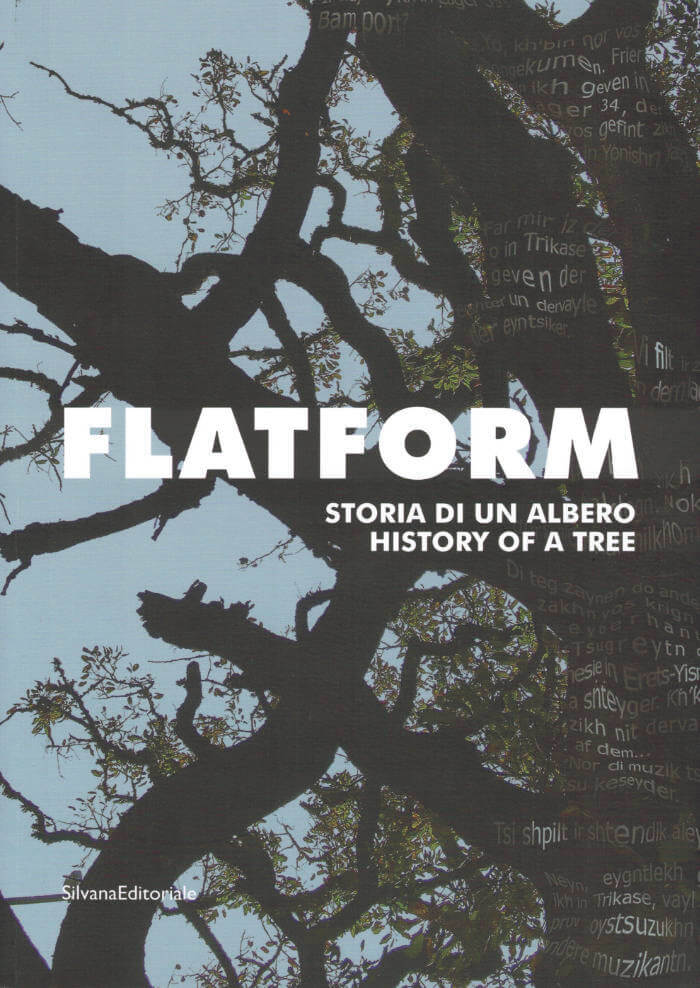
History Of A Tree
In a reality in which the boundaries between cinema, art, installation and multimedia experimentation seem to be increasingly blurred, History of a Tree by Flatform is a project that sets out to radically alter the idea of the portrait in western art.
A non-human living organism – the Oak of the Hundred Knights of Tricase, the oldest Vallonea oak in Europe at the age of 900 years – and the territory in which it has stood for centuries become the subject: through a film and a robotized video installation, statements become a portrait, and are transformed into a work of art.
The book retraces the genesis, development and implementation of this original idea, providing a visual score, the film in 80 images, dialogues in ten languages, the contributions of a tree searcher, an art historian and two philosophers, as well as a series of in-depth essays drawing on the fields of science, history, anthropology, music and linguistics.
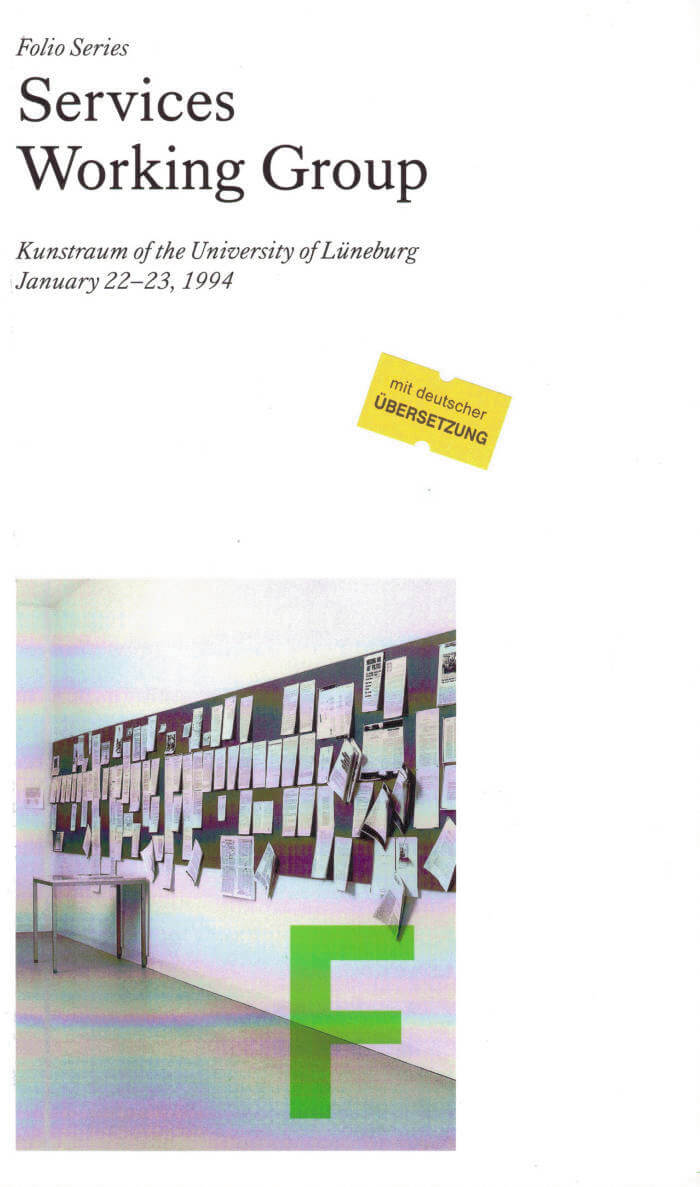
Services Working Group
Folio F presents complete transcripts from the ground-breaking working group on labour relations and institutional governance in the arts organized in 1994 by Helmut Draxler and Andrea Fraser at the Kunstraum of the University of Lüneburg.
Held on January 22 and 23, 1994, the candid discussions between the organizers, Kunstraum representatives, and invited practitioners were video-recorded. Newly-produced transcripts of this compelling recording are presented here in English and German, documenting the entirety of the debut Services Working Group discussions. These transcripts are supplemented by newly-digitized photograph documentation of the conversations and a newly-commissioned post-script text by Draxler and Fraser that reexamines Services in light of current discussions around the socioeconomic conditions of art and its institutions.
Contributions by:
Judith Barry
Ute Meta Bauer
Jochen Becker
Ulrich Bischoff
Beatrice von Bismarck
Iwona Blazwick
Susan Cahan
Michael Clegg
Stephan Dillemuth
Helmut Draxler
Andrea Fraser
Renée Green
Martin Guttmann
Renate Lorenz
Christian Philipp Müller
Fritz Rahmann
Eric Golo Stone
Fred Wilson
Ulf Wuggenig

Fieldnotes - Issue nr. 2
A quarterly print journal publishing new writing and artworks with a focus on practices that work between disciplines and against type. There is always a third thing between two things that are known; we are interested in whatever there is between translations/transitions, things-in-progress, converging genres, methods of excavation and formal innovation. The purpose of the journal is to provide a test site for ideas and research; a space for experimental modes and new prototypes.
The second issue of Fieldnotes contains new work by:
Apichatpong Weerasethakul
Steve Dutton
Liesl Ujvary
Akio Yuguchi
Evan Lavender-Smith
Dodie Bellamy
Paul Maheke & Giles Bailey
Yan Jun
Emily Charlton
Ed Atkins
Sam Buchan-Watts
Elizabeth Price
Mary Mussman
Carolyn Ferrucci
Hanne Lippard
Charlie Godet Thomas
Hannah Regel
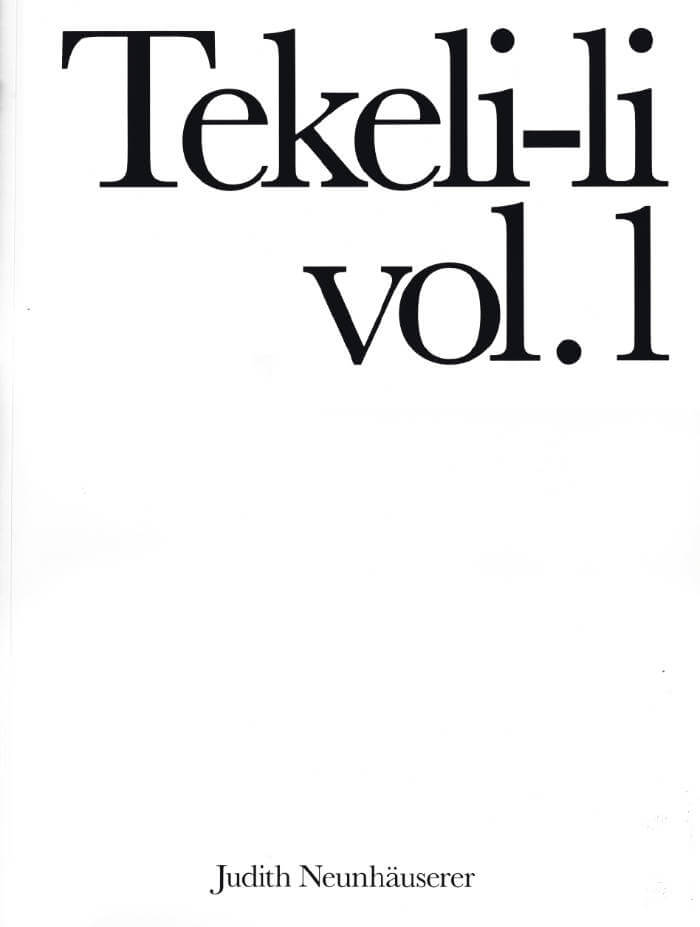
Tekeli-li - Vol. 1
TEKELI-LI in "Mountains of Madness" (1936) by H. P. Lovecraft is a scream that frightens polar explorers upon their arrival in a hidden city at the South Pole. An online bibliography listing Antarctic fictions is called the same.
Taking the shape of an encyclopedia and an adventure book, "Tekeli-li" is the first catalogue of artist Judith Neunhäuserer, mapping the various elements constituting her œuvre and research. This book includes a special ephemera: a handmade recycled A4 made from the publications used during her research.
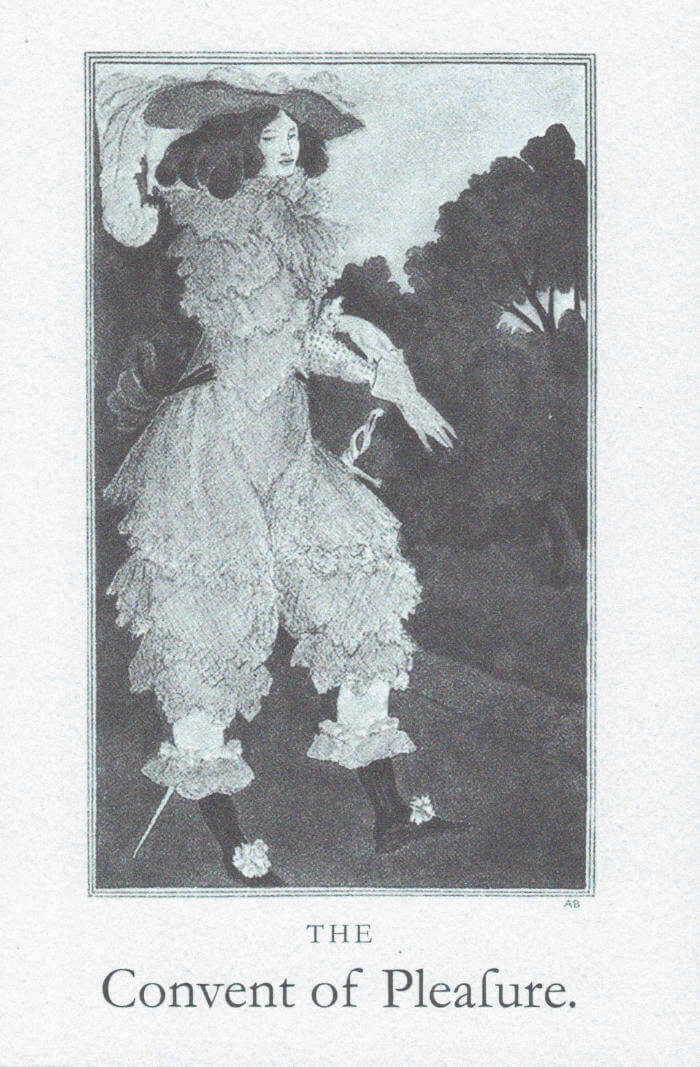
The Convent of Pleasure
The Convent of Pleasure is a play written by Margaret Cavendish in 1668. The play is a comedy about noblewomen who choose to retreat to a convent to create their own community in order to avoid the constraints and pains of marriage and men. Lady Happy, the main protagonist, ponders the question of a radical alternative to marriage: “But why may not I love a woman with the same affection I could a man?” This book is a close reproduction of the first printed edition of the play, which was supervised and edited by hand by Cavendish.
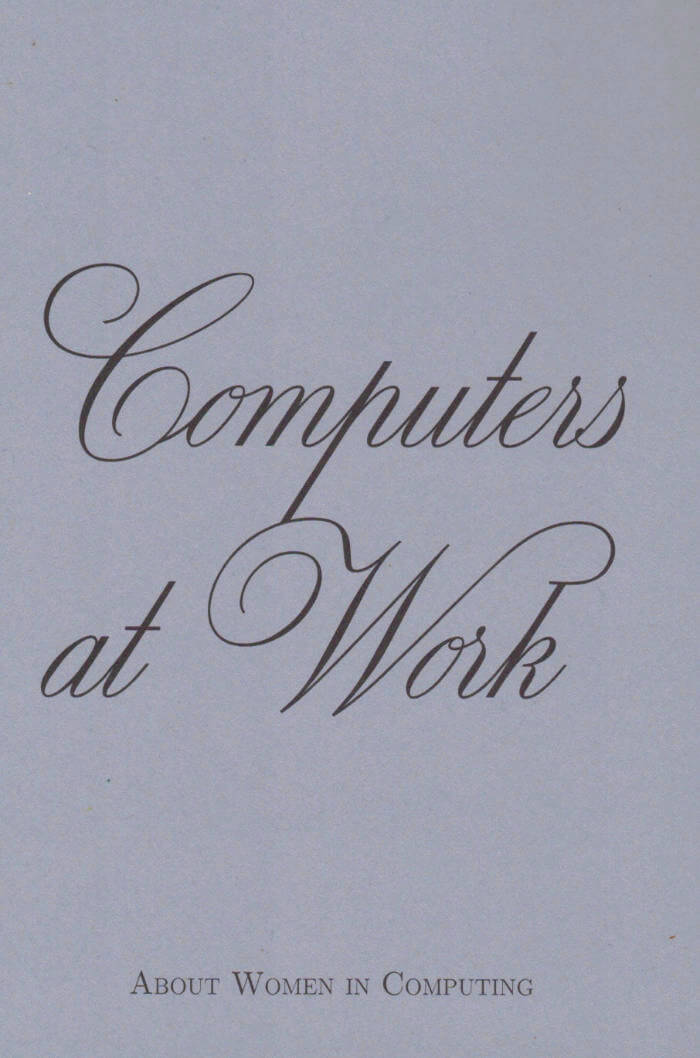
Computers At Work
Computers at Work presents an overview of the role women played in the building and shaping of the computing field from the 18th century to the present day. It aims to articulate in what way women’s systematic erasure from history has transformed computing from being perceived as “women’s work” to an industry that is largely hostile to them.

Vice Versa — America's Gayest Magazine
Vice Versa is on of the first known lesbian magazine in the world. Lisa Ben wrote, edited, printed and distributed the magazine for nine months in Los Angeles in the late 1940s. This publication gathers the nine issues she has published.
Lisa Ben explained in an interview: "I would type it out during working hours. I had never enough work—I was a fast typist. And my boss would say: 'Well, I don't care what you do if your work is done. But I don't want you to there and knit or read a magazine... I want you to look busy.' So I had plenty to keep me busy and that's how I put together VICE VERSA... I used the office stapling machine. I used the manila folders form the office, and I didn't feel a bit guilty about it! I should have, but I didn't."
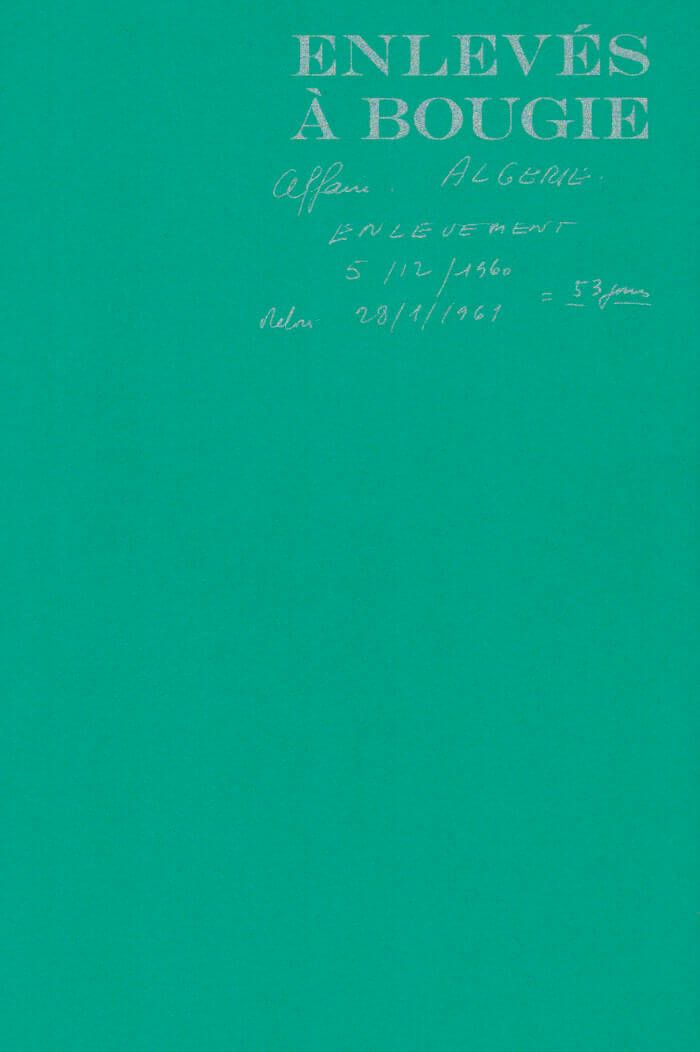
Enlevés À Bougie
Enlevés à Bougie is a visual archive compiling documents from the kidnapping of a French state employee during the War of Independence, in 1960, Bougie, Algeria.
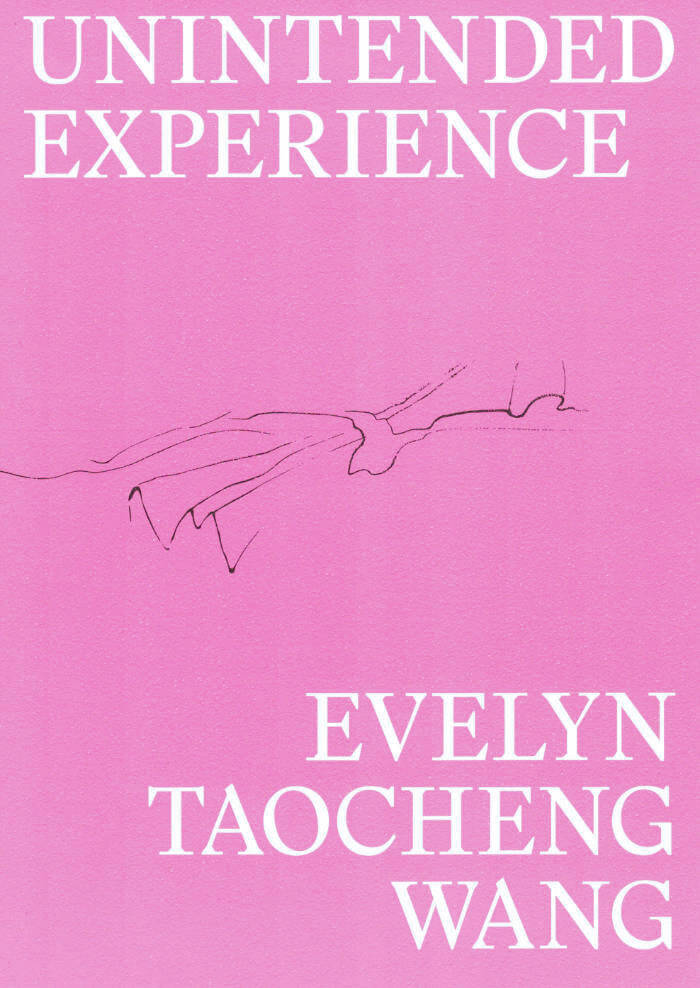
Unintended Experience. A job in Amsterdam
A new version of After 8 Books' first publication and bestseller: Evelyn’s adventures as a transgender masseuse in Amsterdam, back when she was a young artist, supporting herself by working in a massage salon. The texts are witty, sharp and thoughtful, reflecting a very specific community of friends and coworkers and its counterpart, the male clientele. The drawings illustrating those texts are dreamlike watercolors, perfect companions to Unintended Experience’s diaristic journey.
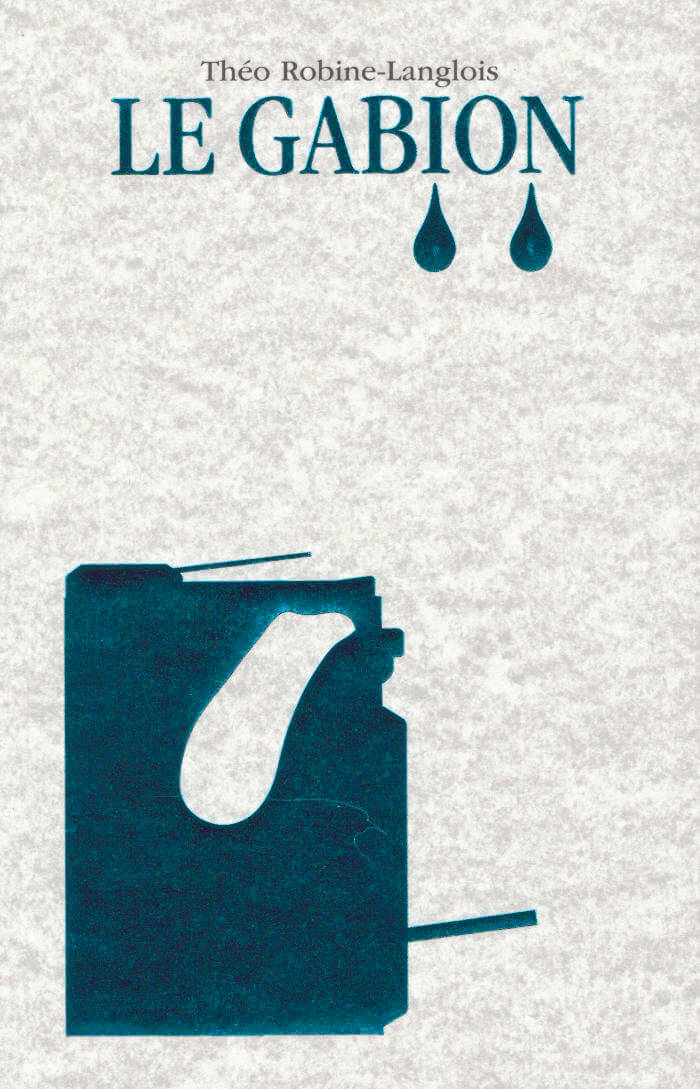
Le Gabion
Au départ, une simple anecdote: un gabion de chasse typique des marais normands se détache de son ancrage pour dériver dans l’Océan Atlantique, avec des chasseurs incapables de nager à son bord. Théo Robine-Langlois transpose cette histoire à une échelle interstellaire: le Gabion, vaisseau spatial chasseur d’astéroïdes conçu pour être attaché à la Terre, dérive dans l’espace. À la suite d’Anton, on traverse les différentes communautés qui peuplent le bâtiment, monde en soi où se côtoient et s’affrontent des mœurs, des modèles de société, et surtout des formes de langage. Anton, lui, tente d’échapper à celui qui prétend régir le vaisseau, en récoltant des photocopies éparpillées dans ses méandres, jusqu’à son mystérieux cœur...
Empruntant au roman d’apprentissage autant qu’à la science-fiction, Le Gabion est aussi une chanson de geste: une odyssée symbolique où la langue et la figure de l’auteur sont traités de manière expérimentale, comme faisant partie du récit lui-même. Les langues que parlent les personnages contaminent le livre, qui se construit comme un montage où poésie, philosophie, histoire littéraire, hip hop et échanges SMS se rejoignent. En parcourant le Gabion, les lecteur.trice.s rencontrent différents rapports au langage, qui se concrétisent à la fin du livre par l’élection d’un maire de banlieue parisienne.
Le Gabion poursuit le travail entamé par Théo Robine-Langlois dans son premier livre, [...], où le subterfuge typographique des points de suspension entre crochets signifiait à la fois l’existence de trous dans la langue, d’échappatoires dans l’imaginaire, et de nuages dans le ciel. Dans Le Gabion, on peut se cacher dans un paragraphe, lire entre les lignes d’un manuel de photocopieuse, se battre avec des missiles-poèmes, rencontrer des enfants sanguinaires et des sororités féministes. On traverse également plusieurs siècles de poésie française, des troubadours à Henri Chopin ou Hélène Bessette.
Texte en Français
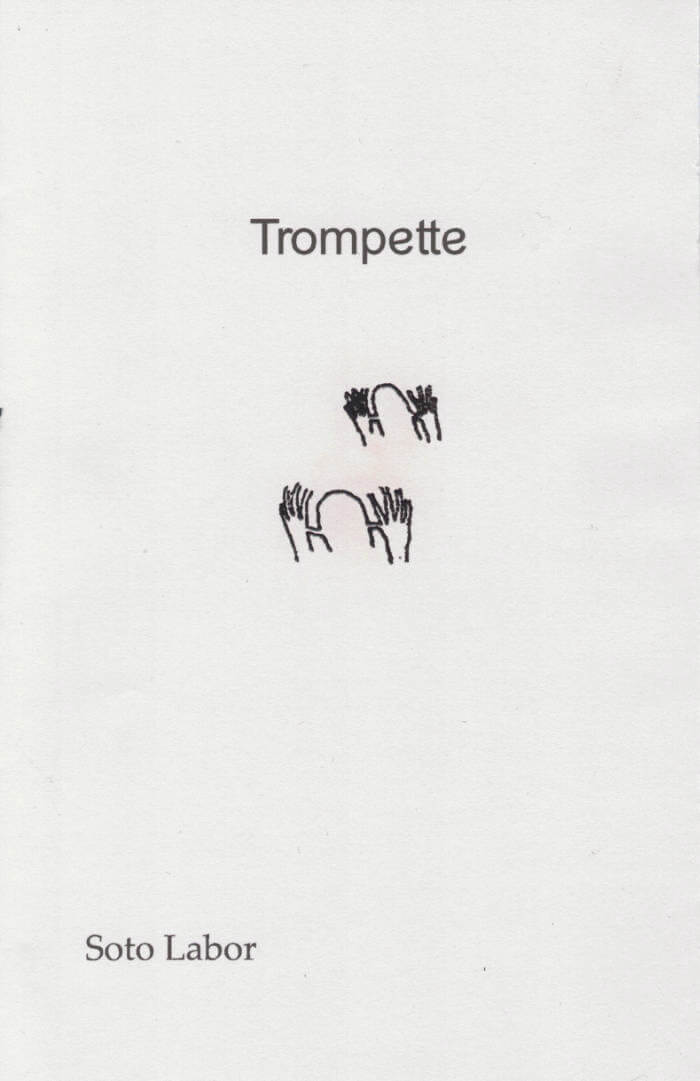
Trompette
Yesterday as they smoked, a cigarette butt leaked and burned
their delicately stitched summertime pyjamas. A round hole
on their torso reminded the holes drilled in the wall the day
before to ventilate their room.
Trompette gathers three short texts by Soto Labor, along with their beautiful drawings, that tell about magnificient animals who observe and eat the world.
Bilingual, French & English.
Trois courts textes de Soto Labor, accompagnés de ses dessins, où des animaux magnifiques observent et mangent le monde.
Bilingue français/anglais.
The Presage Pamphlet Series welcomes new, shorter and more portable text formats, printed in-house (it’s cheap & chic!).

Having a party (hope you will be there)
"Having a party (hope you will be there)", is a catalogue of an exhibition organized by Mickael Marman and D&TLG at CFAlive in Milan with artists from the black European diaspora, including original contributions, photos of the show, as well as a brand new intro text by Olamiju Fajemisin.

You have within you something stronger and more numinous
'You have within you something stronger and more numinous' by Margarita Maximova is a collection of extracts of letters sent to her by her mother over the course of ten years.
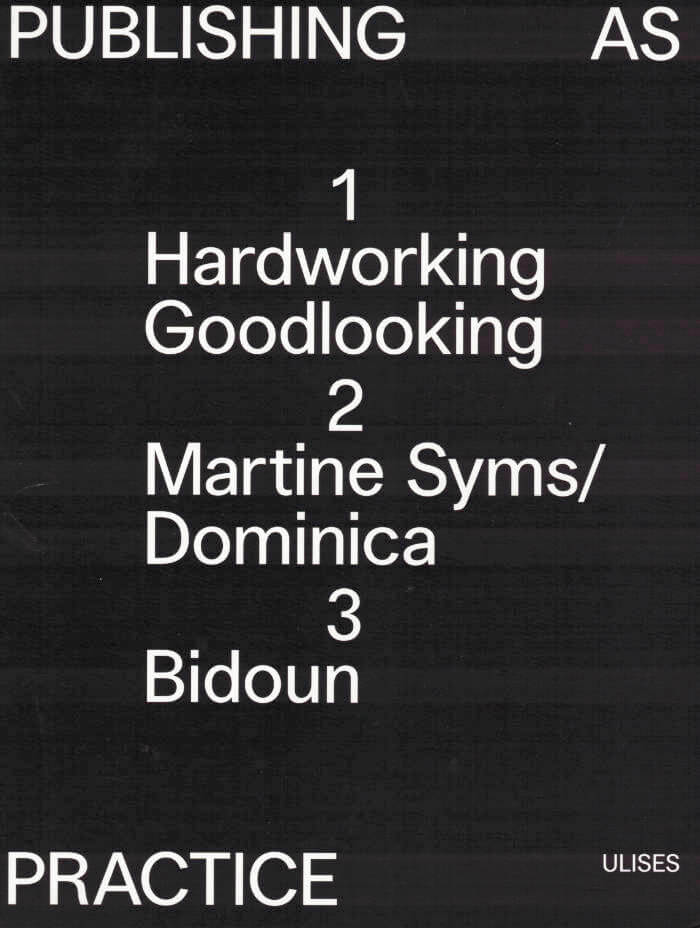
Publishing as Practice
Publishing as Practice centers on the work of three contemporary artists/book publishers who have developed fresh ways of broaching the political in publishing.
This book documents a residency program at Ulises—a curatorial platform based in Philadelphia—that explores publishing as an incubator for new forms of editorial, curatorial and artistic practice. Over the course of two years, three participants (Hardworking Goodlooking, Martine Syms/Dominica, and Bidoun) activated Ulises as an exhibition space and public programming hub, engaging the public through workshops, discussions, and projects.
Hardworking Goodlooking is a design and publishing imprint working primarily out of the Philippines. Dominica is an imprint run by artist Martine Syms dedicated to exploring Blackness as a topic, reference, marker, and audience in visual culture. Bidoun, a non-profit organization and magazine, focuses on art and culture from the Middle East and its diasporas. Each organization approached their residency at Ulises in a unique way, bringing a new understanding of what it means to practice publishing.
Edited by Kayla Romberger, Gee Wesley, Nerissa Cooney, Lauren Downing, and Ricky Yanas, Publishing as Practice features a preface by David Senior, Head of Library and Archives at the San Francisco Museum of Modern Art, and Ulises Carrión’s 1975 publishing manifesto “The New Art of Making Books.” Publishing as Practice also includes writing from Clara Balaguer, Hardworking Goodlooking, Martine Syms/Dominica, Bidoun, Lauren Downing, Kayla Romberger, and Gee Wesley alongside interviews, excerpts, and documentation from each residency.
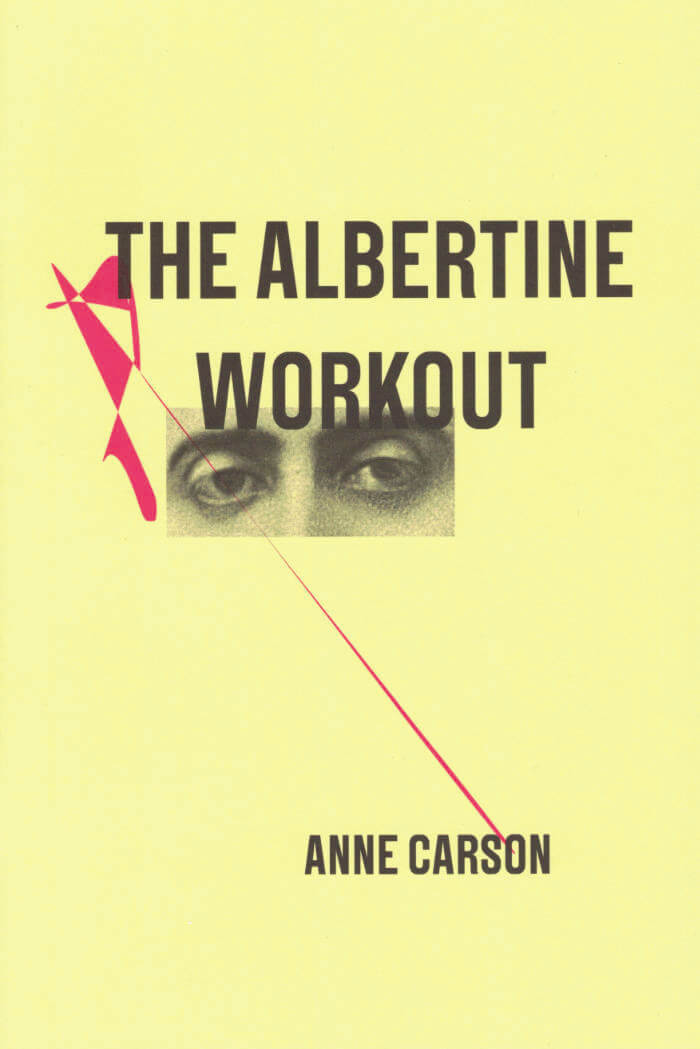
The Albertine Workout
The Albertine Workout contains fifty-nine paragraphs, with appendices, summarizing Anne Carson's research on Albertine, the principal love interest of Marcel in Proust's Á la recherche du temps perdu.

Fair Arts Almanac 2019
In 2019 SOTA finished the first Fair Arts Almanac. The content of the book was generated during a week long summer camp in 2018 with about 70 contributors. The result was a bundling of tips & tricks, statements & demands, visions & ideas, dates & data, testimonies & voices, addresses & announcements on fairness within the complex relationships between the artistic, political and economic sphere. The compilation of various contributions in this first edition was deliberately associative and open for debate, full of contradictions, loose ends and inconsistencies.

Some Styles of Masculinity
An intimate, urgent and riotous account of masculinity, whiteness, queerness and belief in America.
In winter 2018, Gregg Bordowitz performed a three-part lecture series at the New Museum as part of Trigger: Gender as a Tool and a Weapon. Each evening, he explored an avatar of masculinity that was formative to him as he came of age as an outer-borough child of Jewish immigrants, then as an artist-activist in Manhattan at the dawn of the AIDS crisis: the rock star, the rabbi and the comedian. He merged personal and political history, ribald humor and social criticism, performer and persona.
Some Styles of Masculinity is a self-portrait and an essay on upheaval and plague, based on transcripts of the eponymous series, which Bordowitz has reimagined for the page. He asserts that gender can't be separated from ethnicity, sexuality, class or nationality, and he connects these aspects of himself through personal anecdotes as well as reflections on whiteness, diaspora, comedy and Jewish mysticism. Some Styles of Masculinity evokes David Antin's "talk poems," Maggie Nelson's "autotheory," David France's How to Survive a Plague and Wayne Koestenbaum's casually erudite criticism. This book is a winding, intimate, urgent, freewheeling account of thinking and enduring in difficult times.
Gregg Bordowitz (born 1964) is the author of Glenn Ligon: Untitled (I Am a Man) (2018), General Idea: Imagevirus (Afterall Books, 2010) and The AIDS Crisis Is Ridiculous and Other Writings, 1986-2003 (2004). He was an early participant in ACT UP (AIDS Coalition to Unleash Power), where he cofounded several video collectives.

Evolution
"In Eileen Myles's newest book of poetry, Evolution, we encounter an arrival, a voice always becoming, unpinnable and queer. Myles's new poems are transformations, and perhaps a culmination of the poet's previous inquiries into love, gender, poetry, America, and its politics . . . The form of Myles's work rivals its subject matter in intimacy. The lines in Evolution are physical, a body unleashed but not yet comfortable and not without fear. The short lines rush down the page, movement as touch, touch as freedom." — Natalie Diaz, New York Times Book Review
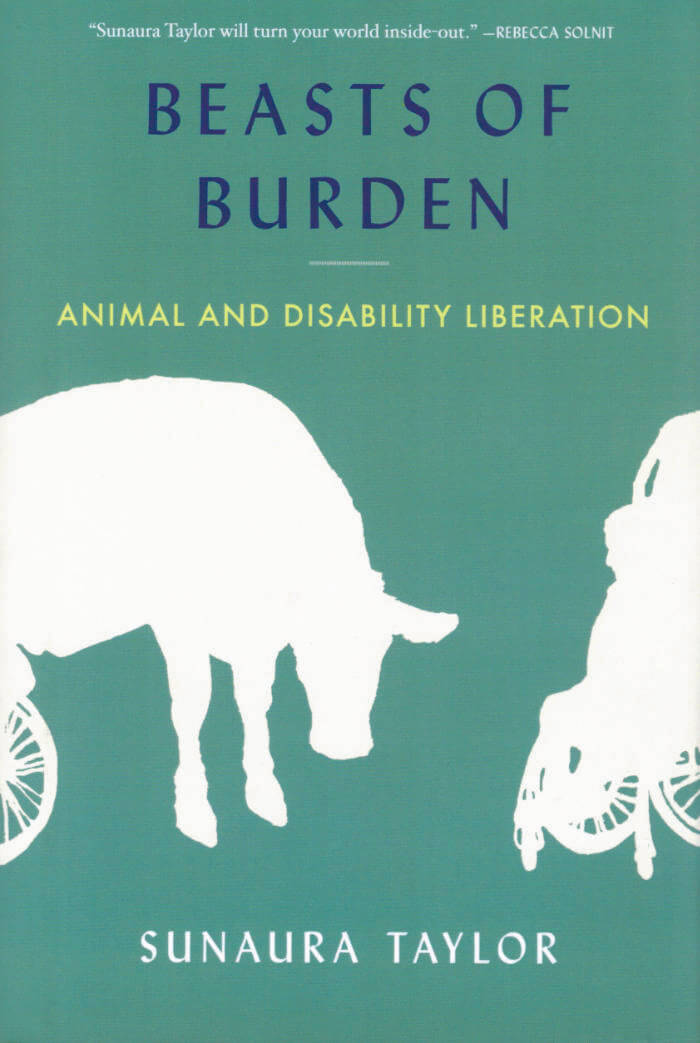
Beasts of Burden: Animal and Disability Liberation
A beautifully written, deeply provocative inquiry into the intersection of animal and disability liberation, and the debut of an important new social critic.
How much of what we understand of ourselves as "human" depends on our physical and mental abilities, how we move (or cannot move) in and interact with the world? And how much of our definition of "human" depends on its difference from "animal"?
Drawing on her own experiences as a disabled person, a disability activist, and an animal advocate, author Sunaura Taylor persuades us to think deeply, and sometimes uncomfortably, about what divides the human from the animal, the disabled from the nondisabled, and what it might mean to break down those divisions, to claim the animal and the vulnerable in ourselves, in a process she calls "cripping animal ethics."
Beasts of Burden suggests that issues of disability and animal justice—which have heretofore primarily been presented in opposition—are in fact deeply entangled. Fusing philosophy, memoir, science, and the radical truths these disciplines can bring, whether about factory farming, disability oppression, or our assumptions of human superiority over animals, Taylor draws attention to new worlds of experience and empathy that can open up important avenues of solidarity across species and ability. Beasts of Burden is a wonderfully engaging and elegantly written work, both philosophical and personal, by a brilliant new voice.
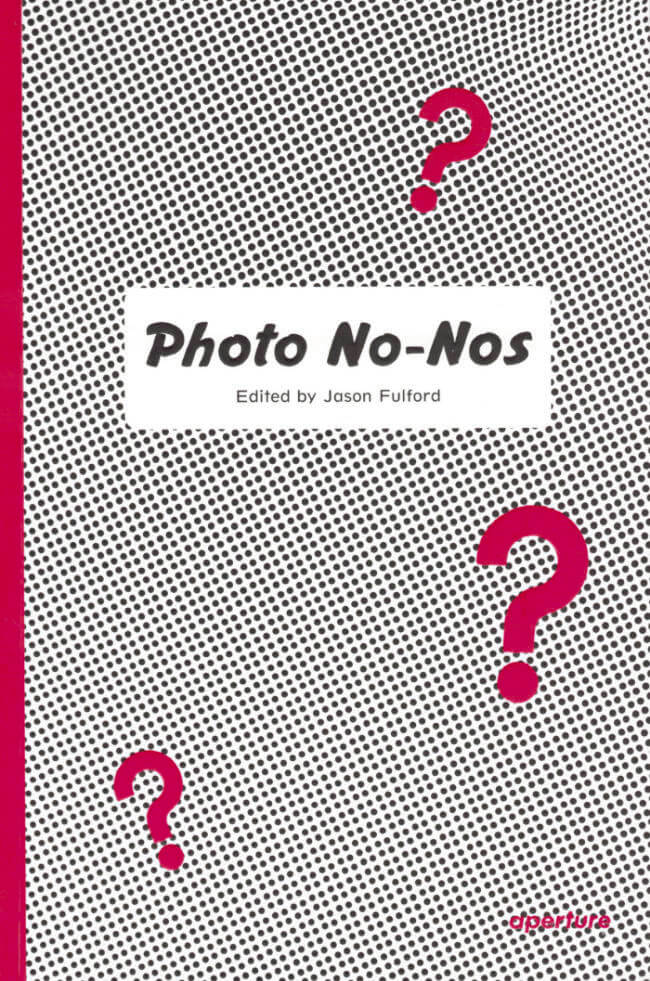
Photo No-Nos: Meditations on What Not to Photograph
At turns humorous and absurd, heartfelt and searching, Photo No-Nos is for photographers of all levels wishing to avoid easy metaphors and to sharpen their visual communication skills.
Photographers often have unwritten lists of subjects they tell themselves not to shoot—things that are cliché, exploitative, derivative, sometimes even arbitrary. Photo No-Nos features ideas, stories, and anecdotes from many of the world's most talented photographers and photography professionals, along with an encyclopedic list of more than a thousand taboo subjects compiled from and with pictures by contributors.
Not a strict guide, but a series of meditations on "bad" pictures, Photo No-Nos covers a wide range of topics, from sunsets and roses to issues of colonialism, stereotypes, and social responsibility. At a time when societies are reckoning with what and how to communicate through media and who has the right to do so, this book is a timely and thoughtful resource on what photographers consider to be off-limits, and how they have contended with their own self-imposed rules without being paralyzed by them.
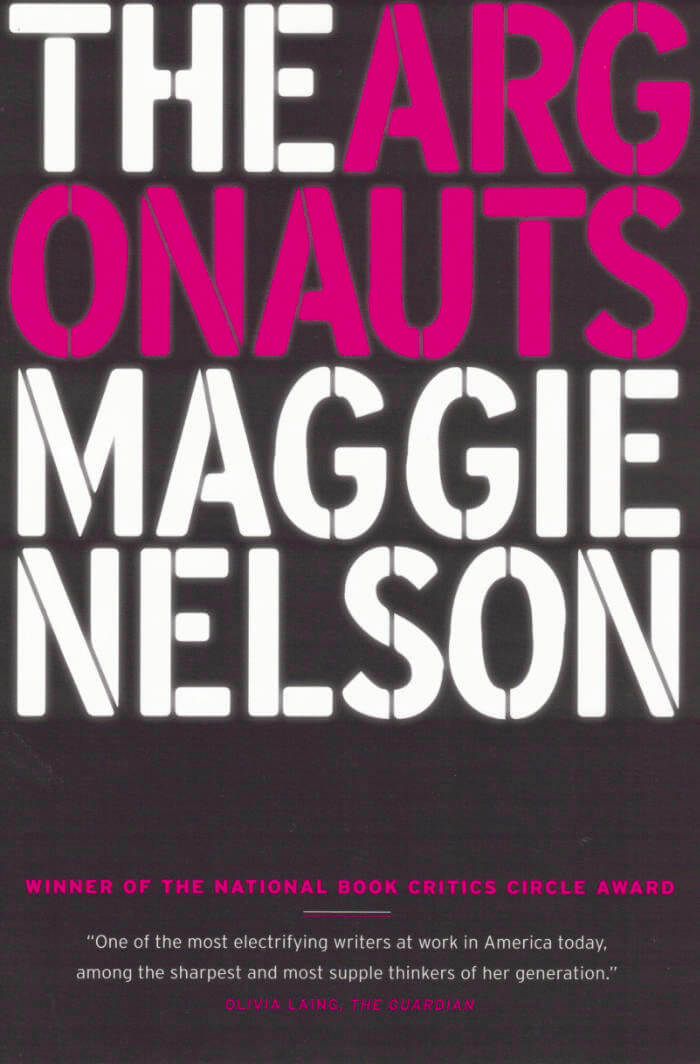
The Argonauts
Maggie Nelson's The Argonauts is a genre-bending memoir, a work of autotheory offering fresh, fierce, and timely thinking about desire, identity, and the limitations and possibilities of love and language. It binds an account of Nelson's relationship with her partner and a journey to and through a pregnancy to a rigorous exploration of sexuality, gender, and family. An insistence on radical individual freedom and the value of caretaking becomes the rallying cry for this thoughtful, unabashed, uncompromising book.

Reading Room: An Experiment in Expanded Reading
“Reading Room: meeting the universe halfway is a book – a collection of five booklets – that came out of a multi-sensory project created by Harriet Plewis that attempted to make sense of a key text by theoretical physicist and feminist theorist Karen Barad.
The volume contains a booklet describing the ideas, experiments and practices of expanded reading in reference to Barad’s text, and the remaining four booklets are workbooks, or manuals, to help people replicate or expand on the ideas themselves. The books were produced by the artist in collaboration with Sam Whetton and Chery Styles.”
5x A5 booklets, All black & white digitally printed, 4x saddle stitched 1x perfect bound. Comes sandwiched between embossed card.